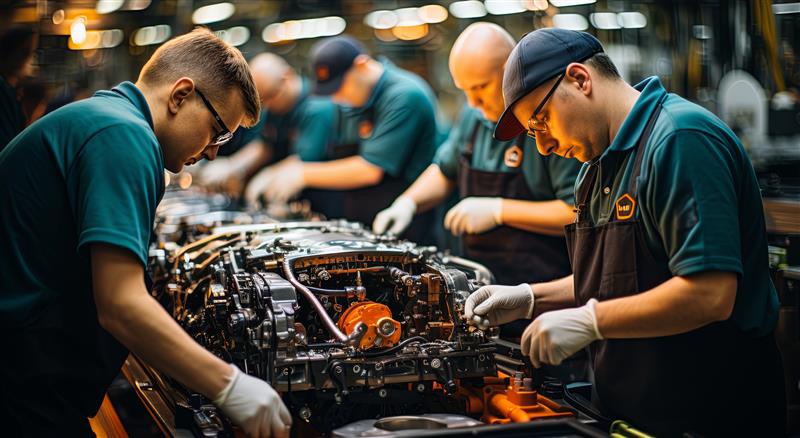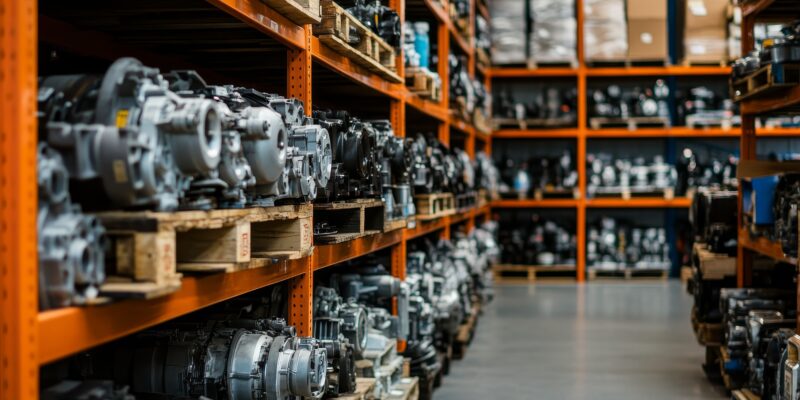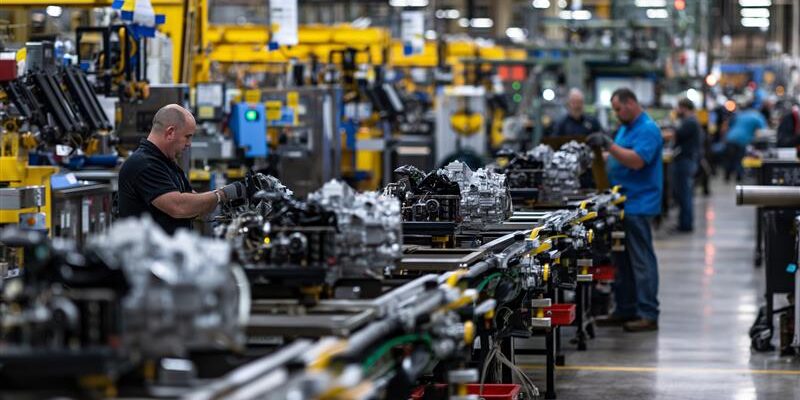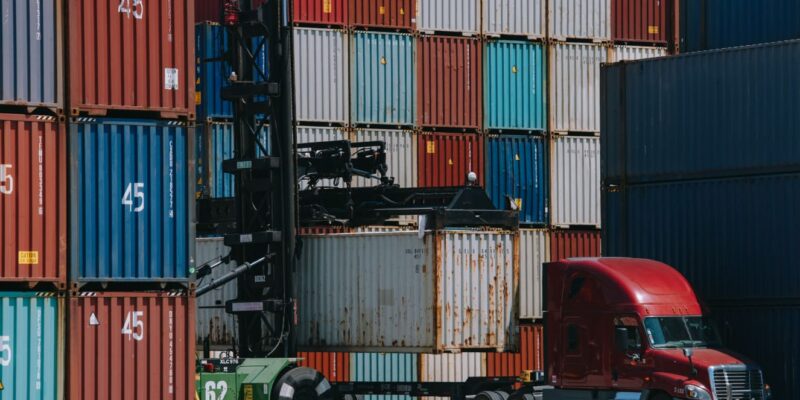The automotive supply chain: Balancing efficiency and resilience in an uncertain world

Automotive manufacturers are known for keeping inventories low and relying heavily on just-in-time (JIT) deliveries. For this strategy to work, production schedules and freight deliveries must align perfectly, meaning even the slightest delays can bring production lines to a standstill. Disruptions have always been a concern for just-in-time manufacturers, the pandemic being just one recent example of the vulnerabilities they face, which means automotive suppliers and manufacturers must consistently evaluate their logistics strategies to stay ahead of changes in the industry.
Supply chain uncertainty remains a significant concern due to the rising cost of materials, tariffs on imported cars and car parts, and sourcing challenges. Shifting consumer sentiments also play a role in the auto supply chain, as online shopping and the affordability of vehicles have impacted the way consumers purchase cars today. As a result, original equipment manufacturers (OEMs) remain focused on balancing efficiency and resiliency with managing costs and staying agile.
Visibility and technology, coupled with a strategic logistics partner to provide guidance can help auto manufacturers and suppliers reduce waste, cut costs, and increase reliability to face the uncertainties of the automotive supply chain today.
Improving visibility across the supply chain
In addition to JIT deliveries, automotive manufacturers use just-in-sequence (JIS) deliveries, where parts and components are delivered in the exact order needed for assembly to optimize the flow of materials. JIS increases efficiency in the plant by reducing handling and sorting, but it requires close coordination and reliable, on-time deliveries from suppliers.
Since every minute counts in JIT and JIS manufacturing, real-time visibility into deliveries and production schedules is essential. Electronic logging devices, which are now mandatory for most carriers, have increased carrier connectivity and can provide real-time freight status updates. A transportation management system (TMS), such as Uber Freight’s TMS, can also provide real-time shipment tracking while enabling route optimization, data-driven decision-making, and opportunities to cut costs.
Forecasting demand to reduce costs
To ensure the right inventory is available and reduce the reliance on expedited deliveries, automotive manufacturers and suppliers need accurate demand forecasting.
But even the best forecasts can’t account for every potential disruption. Disruptions like volatile trade conditions, and even low water levels in the Panama Canal have led many companies to re-evaluate their inventory strategies to help them navigate uncertainty. Without more advanced solutions to handle these disruptions systematically, organizations are forced to fall back on just-in-case (JIC) inventory strategies.
Holding inventory creates additional costs, but those expenses are often minimal for some commodities compared to the financial and operational impact of expediting freight. Savings associated with lean inventories can evaporate quickly if emergency shipments are the only option to keep production running. Uber Freight experts can help automotive manufacturers and suppliers evaluate current inventory strategies and develop tailored solutions to optimize supply chain operations.
Fine-tuning JIC inventory practices can help companies find the balance between controlling costs and increasing resiliency.
Bundling products to decrease downtime
Because JIT and JIS shipments go directly to the production line, manufacturers lean on their suppliers to bundle products together. Bundling all of the parts needed for a specific task decreases the need for those on the assembly line to pick and sort individual parts, which increases efficiency. It also helps ensure that all of the needed parts are in the right place at the right time and that nothing is missing, decreasing downtime. In the automotive supply chain, typical replenishment methods include:
- Sequenced racks: Storage racks that hold parts in the exact order and orientation required for assembly.
- Sequenced layers of bin parts: A layered stacking method where bins contain parts in the exact sequence needed for assembly.
- Kitted products: Parts are pre-grouped into kits near the assembly line, containing everything needed for production.
Suppliers bundling parts and components have to pay extra attention to detail to meet manufacturers’ requirements. Every minor mistake—such as mis-sequencing a rack, missing a bin replenishment, or shipping a kit with incorrect parts—can lead to expensive production line stoppages—up to $695 million a year at a large plant.
Conducting a facility assessment is an effective way for shippers to understand their warehousing operations and performance. Uber Freight experts can guide a facility assessment to help auto shippers find improved storage solutions and reduce unnecessary expenses, boosting overall efficiency.
Strategically locating suppliers
JIT and JIS deliveries require highly reliable suppliers and logistics providers. Even just one hour of a down assembly line can result in millions of dollars in losses, often making on-time delivery more critical than cost per mile. To help minimize potential delays, OEMs have moved away from single sourcing and have localized suppliers where possible. Many auto manufacturers prefer that their tier 1 suppliers be within hours of their production site.
But staying ahead of supply chain risks requires more than just proximity. Companies need a comprehensive risk assessment and network design to pinpoint vulnerabilities in specific components, production areas, or transportation routes. By executing a network cost savings and capacity analysis, Uber Freight’s Consulting team helped an oil and fuel distributor identify key opportunities for improvement in their network design, saving the company $16 million over two years.
Effective assessments require suppliers to be vulnerable enough to ask others to assess their situation for gaps and, more importantly, act on what those assessments reveal.
Keeping products moving and optimizing efficiency
The automotive industry relies on high-volume, high-frequency deliveries, so keeping freight moving is essential. Trailer pools that enable drop-and-hook freight can increase efficiency and reduce detention at the docks. Instead of drivers waiting for live loads, they can hook up to preloaded trailers and get back on the road. Then, they drop the trailer at its destination.
Powerloop, an Uber Freight capacity solution, gives carriers access to trailer pools—regardless of size. Any carrier in Uber Freight’s network can access any Powerloop trailer, resulting in higher asset utilization and eliminating the need to keep a large volume of trailers on site.
Building long-term partnerships
Strong partnerships are a critical component of freight reliability. The pandemic reinforced the importance of strategic collaborations and the need to go beyond transactional relationships.
When supply chain partnerships are treated as commodities, businesses may be prioritizing short-term cost savings over long-term stability and resilience. Thinking longer term when awarding business can help companies avoid the costs associated with changing from one provider to another. It can also help ensure better service that leads to improved operational efficiency. Hyundai and GM, for example, entered into a strategic agreement to collaborate on supply chains in late 2024, which includes combining sourcing efforts to reduce the cost of raw materials needed to make EV batteries.
Improving sustainability
Sustainability is becoming increasingly important in the automotive supply chain. Auto shippers are prioritizing rail conversions to cut carbon emissions, integrating electric and hybrid vehicles into their fleets, and investing in sustainable materials. Increasing supply chain efficiency also has a positive impact on sustainability. Trailer pools can eliminate idling while network optimization can help eliminate miles, lowering fuel consumption in most cases.
Manufacturers also want to know that their suppliers are focused on sustainability. Uber Freight’s GLEC Emissions Dashboard provides emissions estimates that can help companies assess and reduce their carbon footprint, supporting industry-wide sustainability initiatives.
Uncovering opportunities with a high-level view
A bird’s eye view of a transportation network can help uncover bottlenecks, inefficiencies, and ways to reduce spending. Most automotive networks require stable repetitive runs, which are often underutilized. Instead, suppliers and manufacturers will augment repetitive runs with costly expedited freight. But because price is still the most important factor for the majority of car consumers, automotive OEMs must find ways of optimizing costs while maintaining the stability of their network.
Uber Freight worked with Blue Bird Bus, a school bus manufacturer that produces more than 9,000 school buses annually, to give the manufacturer more visibility across its supply chain through the TMS, help ensure materials arrive on time, and keep production lines moving. Uber Freight’s transportation experts helped Blue Bird centralize their procurement management, execution, business intelligence, and call-ahead standardization, saving them $3 million.
Remaining agile to navigate disruptions
The need to maintain production amidst disruptions and cost pressures makes automotive logistics a challenge. When even minor delays can result in millions of dollars of downtime, investing in solutions to increase visibility, improve demand forecasting, and optimize networks can help automotive manufacturers and suppliers control costs while keeping their production lines moving. By partnering with Uber Freight, automotive suppliers can increase efficiency with intelligent logistics solutions tailored to their needs.
Intelligent logistics for automotive supply chains
Increase efficiency and end-to-end visibility with the industry-leading combination of technology, expert partnership, and dynamic capacity to reduce costs and streamline your automotive manufacturing supply chain.



